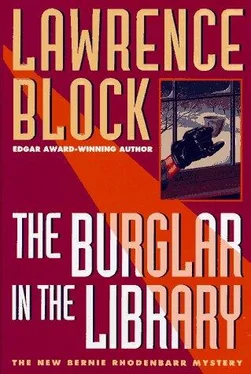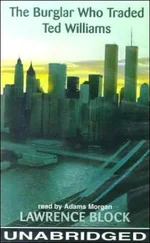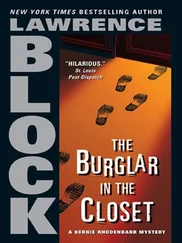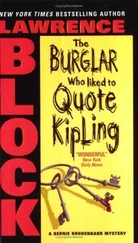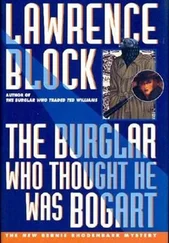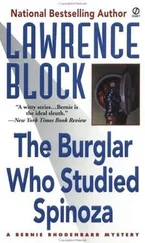“Well, stick around for a minute,” I said. “Long enough to explain why the killer would want to keep all of us from leaving.”
He opened his mouth to say something, then closed it, then shrugged. “I don’t know,” he said. “So?”
“So it’s interesting,” I said. “Here he’s murdered a man and he’s arranged things so that the cops can’t be called right away. And then at the same time he’s cut off his own escape route. We can’t leave, and neither can he.”
I let the silence hang in the air. Miss Dinmont was the first to break it. “He had us all trapped. And he could take his time and kill us off one by one. First Orris, then the cook, then Mr. Wolpert and Mr. Rhodenbarr-”
“But Mr. Rhodenbarr’s alive,” Miss Hardesty pointed out. “And Mr. Wolpert was the killer himself.”
“That’s true,” Miss Dinmont said, her voice a little calmer now. “It’s all very confusing, isn’t it?”
“Very,” I told her. “And I was thinking along the same lines as you, Miss Dinmont.”
“You were?”
“I was. And it’s all because I thought this was an English-country-house kind of murder. But it’s not.”
“It’s not?”
“Mean streets,” Carolyn said.
I nodded. “I thought a desperate fiendish killer was going to work his way through the guest register, knocking us off one by one. But what we’ve got in actual fact is a man who killed one person and wants to get away with it. That’s why he did what he could to make it look like an accident, arranging Rathburn’s body at the foot of the library steps. No one would suspect the man had actually been murdered, and if by some miracle the cops found anything incriminating, well, he’d be hundreds of miles away by then. And, to make sure he’d have a head start on them, he tore out the phone wires.”
Littlefield sighed theatrically. “Isn’t that what I said, Rhodenbarr?”
“Not quite. You said the killer also sabotaged the bridge and the snowblower. But he didn’t.”
“Oh?” said the colonel. “How can that be?”
“I guess the bridge was an accident after all,” Greg Savage said, “and I hope your insurance coverage is up to date, Nigel. As far as the snowblower is concerned, well, I guess the thing just conked out by itself. You know how some cars won’t start on really cold days? Maybe it was like that.”
“Snowblowers are supposed to perform on cold days,” I said, “since they’re essentially useless on warm ones. No, I’m willing to bet there was sugar in that gas tank, and I know damn well the bridge supports were cut. But not by the killer.”
“Then who-”
“Someone who didn’t want the killer to get away. Someone who’d been keeping an eye on Rathburn because he sensed an opportunity for profit. If he could isolate Cuttleford House, with nobody coming or going, he might do himself some good.”
“I don’t see why Wolpert couldn’t have done that,” Dakin Littlefield said. “It’s true he tried to make Rathburn’s murder look like an accident, but you proved it wasn’t. So he realized somebody would try to get out and call the cops, and he went and cut the ropes supporting the bridge.”
I shook my head. “No footprints.”
“No footprints?”
“Going to and from the bridge. It was deep and crisp and even out there until Orris slogged through it. You and Lettice got here late last night, Littlefield, and it looked for all the world as though no one had been on the path to or from the bridge since the two of you.”
“That’s true,” Nigel Eglantine said. “That was deep virgin snow that Orris had to walk through, poor lad. I remember noticing the depth of it when he set out, and there were no recent footprints to be seen.”
“Footprints in the snow,” Littlefield said, and shook his head.
“Late the night before last,” I said, “Rathburn was murdered. The murderer-let’s call him A-”
“Why not call him Wolpert?”
“Humor me,” I said. “Anyway, A killed Rathburn, made it look like an accident, ducked out to rip out the phone wires, and then went upstairs to sleep the sleep of the unjust. Enter B.”
“B?”
“Our clever little observer. Did he slip into the library and discover Rathburn’s corpse? Possibly, but I don’t think so. I think he cut the bridge ropes before A murdered Rathburn.”
“Why would he do that?” Leona Savage wondered.
“Because, even before A murdered Rathburn, B realized the stage was set. All the players had arrived at Cuttleford House. Once Lettice and Dakin Littlefield had made it across the bridge, it was time for the bridge to come down.”
Littlefield had been leaning against a bookcase. Now he snapped to attention. “Wait a minute,” he said. “What the hell did our arrival have to do with B and the bridge?”
“Once you were here,” I said, “he wanted to make sure you stayed.”
“Well, it worked,” he said. “I’ve been wanting to haul ass since the moment I got to this godforsaken hellhole.”
“Oh, dear,” Cissie Eglantine said. “We try so to make Cuttleford House a pleasant place for all our guests.”
“There, there,” Nigel said, and patted her hand.
“But he called it a godforsaken hellhole,” she protested. “It’s not, is it?”
“Of course not,” the colonel assured her. “Would I spend half the year in a hellhole? The man’s upset, Cecilia.”
“I know the food’s not all it might be,” Cissie said, “because of what happened to Cook, and the snow’s made things difficult for everyone, and what with poor Orris gone-”
The inevitable cry came from Earlene Cobbett.
“Excuse me,” Rufus Quilp said. The fat man was sitting in an overstuffed armchair, and I’d thought he’d been dozing. But he hadn’t missed a thing. “This is getting interesting,” he said. “A killed Mr. Rathburn. B dropped the bridge in the gully, either shortly before or shortly after Mr. Rathburn’s murder. If after, he may not have known it had taken place.”
“That’s correct.”
“And if before, did he know it was likely to take place? Did B expect A would murder Rathburn?”
“Probably not. He knew the Littlefields had arrived, and he didn’t want anyone else coming or going.”
Littlefield sighed, exasperated, but Rufus Quilp persevered. “So he slipped outside,” he said, “and cut the bridge supports. And, I suppose, made assurance doubly sure by sugaring the snowblower.”
“No,” I said. “He didn’t do that, and why should he? It wouldn’t prevent anyone from coming or going. Anyone else could do as Orris did, and indeed what B had done himself to reach the bridge. It might be slow going, especially as the snow continued to fall, but it wouldn’t be impassable for any of us. Except Miss Dinmont, of course. You’d need a clear path for a wheelchair.”
This upset Miss Dinmont, who required immediate reassurance that the snowblower had not been sabotaged as a deliberate attempt to inconvenience or imperil her. When Miss Dinmont calmed down, Mrs. Colibri wanted to know who’d sugared the snowblower.
“Because it seems entirely gratuitous,” she said. “What effect did it have? It simply inconvenienced us.”
“It inconvenienced Orris,” I said. “The person who poured the sugar in the engine-let’s call her C-”
“Her, Bern?”
“Well, him or her,” I said. “I thought I’d give the male pronoun a rest. C didn’t have the slightest idea that A was going to kill Rathburn, or that B was planning to bring down the bridge. All C knew was that it was snowing to beat the band, and that it would be a good joke on young Orris Cobbett if his beloved snowblower could be rendered hors de combat. It was his job to keep the path clear of snow, and the snowblower made that task an easy one, whereas it involved a lot of heavy lifting if you had to do it the old-fashioned way, with a snow shovel.”
Читать дальше
